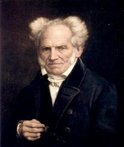Essays of Schopenhauer Ebook Tooltip Ebooks kunnen worden gelezen op uw computer en op daarvoor geschikte e-readers.
Afbeeldingen
Sla de afbeeldingen overArtikel vergelijken
- Engels
- E-book
- 1230001926712
- 22 september 2017
- Adobe ePub
Arthur Schopenhauer
(Bron: Wikipedia. Beschikbaar onder de licentie Creative Commons Naamsvermelding/Gelijk delen.)"
Samenvatting
Arthur Schopenhauer (1788-1860) was a German philosopher best known for his work The World as Will and Representation. He responded to and expanded upon Immanuel Kant's philosophy concerning the way in which we experience the world. His critique of Kant, his creative solutions to the problems of human experience and his explication of the limits of human knowledge are among his most important achievements. His metaphysical theory is the foundation of his influential writings on psychology, aesthetics, ethics, and politics which influenced Friedrich Nietzsche, Wagner, Ludwig Wittgenstein, Sigmund Freud and others. He said he was influenced by the Upanishads, Immanuel Kant, and Plato. References to Eastern philosophy and religion appear frequently in his writing. He appreciated the teachings of the Buddha and even called himself a Buddhaist. He said that his philosophy could not have been conceived before these teachings were available. He called himself a Kantian. He formulated a pessimistic philosophy that gained importance and support after the failure of the German and Austrian revolutions of 1848.
Productspecificaties
Inhoud
- Taal
- en
- Bindwijze
- E-book
- Oorspronkelijke releasedatum
- 22 september 2017
- Ebook Formaat
- Adobe ePub
- Illustraties
- Nee
Betrokkenen
- Hoofdauteur
- Arthur Schopenhauer
- Tweede Auteur
- Arthur Schopenhauer
- Hoofduitgeverij
- Envikabook
Vertaling
- Eerste Vertaler
- Rudolf Dircks
- Tweede Vertaler
- Mrs Rudolf Dircks
- Originele titel
- Essays of Schopenhauer
Lees mogelijkheden
- Lees dit ebook op
- Android (smartphone en tablet) | Kobo e-reader | Desktop (Mac en Windows) | iOS (smartphone en tablet) | Windows (smartphone en tablet)
Overige kenmerken
- Studieboek
- Nee
EAN
- EAN
- 1230001926712
Je vindt dit artikel in
- Categorieën
- Beschikbaarheid
- Leverbaar
- Beschikbaar in Kobo Plus
- Beschikbaar in Kobo Plus
Kies gewenste uitvoering
Prijsinformatie en bestellen
De prijs van dit product is 0 euro en 99 cent.- E-book is direct beschikbaar na aankoop
- E-books lezen is voordelig
- Dag en nacht klantenservice
- Veilig betalen
Alle bindwijzen en edities (8)
-
0,99Direct beschikbaar
-
2,03Direct beschikbaar
-
0,99Direct beschikbaar
-
0,99Direct beschikbaar
-
0,97Direct beschikbaar
-
0,99Direct beschikbaar
-
9,992 - 3 weken
Levertijd
We doen er alles aan om dit artikel op tijd te bezorgen. Het is echter in een enkel geval mogelijk dat door omstandigheden de bezorging vertraagd is.
Bezorgopties
We bieden verschillende opties aan voor het bezorgen of ophalen van je bestelling. Welke opties voor jouw bestelling beschikbaar zijn, zie je bij het afronden van de bestelling.
Tooltip -
14,992 - 3 weken
Levertijd
We doen er alles aan om dit artikel op tijd te bezorgen. Het is echter in een enkel geval mogelijk dat door omstandigheden de bezorging vertraagd is.
Bezorgopties
We bieden verschillende opties aan voor het bezorgen of ophalen van je bestelling. Welke opties voor jouw bestelling beschikbaar zijn, zie je bij het afronden van de bestelling.
Tooltip
Rapporteer dit artikel
Je wilt melding doen van illegale inhoud over dit artikel:
- Ik wil melding doen als klant
- Ik wil melding doen als autoriteit of trusted flagger
- Ik wil melding doen als partner
- Ik wil melding doen als merkhouder
Geen klant, autoriteit, trusted flagger, merkhouder of partner? Gebruik dan onderstaande link om melding te doen.
















